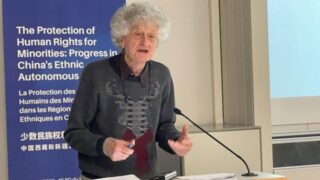Domestic abuse in Kazakhstan must stop, demands a new generation of students, dismayed by entrenched attitudes in their culture.
by Ruth Ingram


Antonida was 38. Her tempestuous marriage was violent and abusive. After years of beatings, her husband Alexi Patel stabbed her to death as the children watched. Police counted twenty-eight stab wounds to her neck, chest, and back. Sixteen of them had been fatal. His family had vetoed their divorce repeatedly, citing the shame of it.
Ayperi’s marriage was characterized by violence and adultery. Driven to eventually commit suicide in front of her three children, relatives washing her dead body reported no area that was not covered with bruises.
Svetlana, a teacher, begged the courts to stop her husband’s daily abuse. They refused to listen until one day she was doused with gasoline and set on fire in front of her children.
These were all women married to Kazakh men who abused them. Their stories were chronicled by the “Немолчиkz” (Nemolchikz), “Do not be silent” movement, a campaign headed up by Dina Smailova, set up in Kazakhstan to raise awareness of sexual harassment and domestic violence.
Kazakhstan’s high rate of femicide and domestic violence has been thrust into the spotlight recently with the public trial of a former government minister accused of killing his wife.


Televised proceedings that since March 27, 2024, have attracted close to three and a half million YouTube views, have captured the nation, as former economy minister Kuandyk Bishimbayev, accused of beating his wife Saltanat Nukenova, 31, to death, has defended himself against charges of murder “with particular cruelty.”
As the courtroom drama plays out at home, live streamed across the nation, photos of other murdered women and their tragic stories were unfurled on banners in cities around the world recently by hundreds of expatriate Kazakh students and young professionals frustrated and angry at a patriarchal culture that sets little value on the lives of women.
The mass protests in fifteen cities across Europe and America attracted victims and activists alike demanding measures to put a stop to the systematic cruelty enshrined in their way of life. Calling for not only robust legislation, they want to see implementation of the law to halt the violence that kills 400 women each year and injures millions.


Coordinator of the protests, Yernur Nurambek, a Kazakh Masters student studying in Italy, told “Bitter Winter” that the trial had brought things to a head in his nation. “It has become a focus for anger and revulsion against attitudes that have gone unchallenged for centuries,” he said. “People have had enough of traditions that view women as less than human and expect them to put up with wanton abuse as the norm.”
“We have a saying, ‘don’t take the trash outside your house,’ meaning ‘don’t complain,’” he said. “This trial is breaking the culture of silence around domestic abuse and forcing us to confront it in our families. It is time to face it and stop it.”
The Bishimbayev case is seen as a litmus test of President Kassym-Jomart Tokayev’s 2022 election promises to prioritize women’s and children’s rights, and the workability of new legislation against domestic violence, hurried through parliament on April 15, 2024, after public outrage and a 150,000 strong petition garnered in the wake of the high-profile alleged murder.
Yernur described a childhood in Kazakhstan where physical violence was the norm. “It was all around us. Where children are beaten as a matter of course, it’s only natural for domestic violence to follow,” he said. “The abuse is generational and cyclical. It’s the way we learn to handle conflict. We see abuse and just get used to it.”
Domestic violence has never been criminalized in Kazakhstan. The 2009 Law on Prevention of Domestic Violence allowed for short term protection orders for up to 30 days but no criminal penalties for abusers. Amendments to this law in July 2017 went even further in decriminalizing “battery” and “intentional infliction of light bodily harm” and abuse was met with cursory fines and up to 60 days detention, which in effect could not be carried out because of the lack of “appropriate holding facilities.”
The laws did nothing to stop the tide of abuse, according to Yernur who said the culture places a taboo on reporting such incidents. Complaints are rarely made, and seldom come to court. “Shame is a huge factor, as is having nowhere else to turn,” said Yernur. “And police are so embedded in the culture that they don’t take complaints seriously, preferring the couple to reconcile without going to court.”
Speaking to “Bitter Winter” anonymously after the London protests, Alina, not her real name, said that she grew up in a violent household. Her mother accepted beatings as a matter of course and blamed herself for her husband’s moods. Alina expected nothing else from her own boyfriends and when one of them flew into a rage and threw her down the stairwell of their block of flats, she was terrified, but was prepared to accept his apology. A head injury sustained as a result of the attack was reported to the police by the hospital, but Alina refused to press charges claiming it was her fault.


“But the event disturbed me greatly,” Alina said. “I ran away and fled the country to get as far away from him as I could. But even with the help of a psychologist I cannot stop thinking of that attack. It has remained with me to this day.”
Gulmira was also at the London event. She spoke to “Bitter Winter” after the event. She said was raped by a cousin when she was five or six, but unable to put into words what had happened to her, blocked out the incident until her early teens. When her father became ill after a stroke, it was never the right time to face her parents with what had happened, and she was forced to wait seven years before breaking the news. She sank into a deep depression, which was compounded as the two families tried to come to terms with what had happened.
She was threatened with a difficult court case if she wanted to go ahead with his prosecution. “I was told there would be detailed questions to answer and I realized I could not survive all this,” she said. “I experienced stress like the time it first happened to me, and I almost went crazy.”
She couldn’t bear to be around her family after this and came to England. “I don’t feel my family is entirely for me,” she said. “I didn’t get the support I was waiting for; just words, and that’s it.”
Upbringing is partly to blame for abuse against women, Yernur explained. “Girls are told from the start that they are guests in their own homes and are just being prepared for a life of marriage and motherhood in new families with their in-laws. And they are expected to fulfill these roles or there will be trouble.”
Heartened by pledges by the new incumbent in his address to the nation in September 2019, in which he advocated an urgent tightening of penalties for sexual violence and domestic violence against women, a series of Women’s Day rallies were held in Almaty from 2020-2023. “But this year’s permit was inexplicably rejected,” said Yernur. “It seems we are going backwards.”


The murder that has gripped the nation propelled the latest domestic violence law through parliament on April 11, 2024, despite many diehards from Kazakh nationalist groups resisting change. For the first time, transgressors will face imprisonment for their crimes.
“It was going to be cancelled right up until the last minute,” he said. “But amazingly it got through in the end.”
This is only the beginning though, said Yernur, who explained that implementation would be a challenge.
But Yernur has observed a seed change in his generation with an eruption in debates about domestic violence provoked by the court case. “There is more openness and urgency to challenge the violence,” he said. “People have had enough of the abuse and the damaging effect on their mental health and that of the nation.”
The growth of social media has meant women are no longer alone with their stories of abuse; particularly those in far flung villages. “They realize they are not the only ones now and gain courage to start to change things. This is a systemic societal problem that needs challenging and for people to realize that it’s not OK.”
“Abuse has a terrible effect on children and people are killed and lives destroyed because of it. We need to stand up and say it’s not OK. We must talk about it more,” said Yernur.









